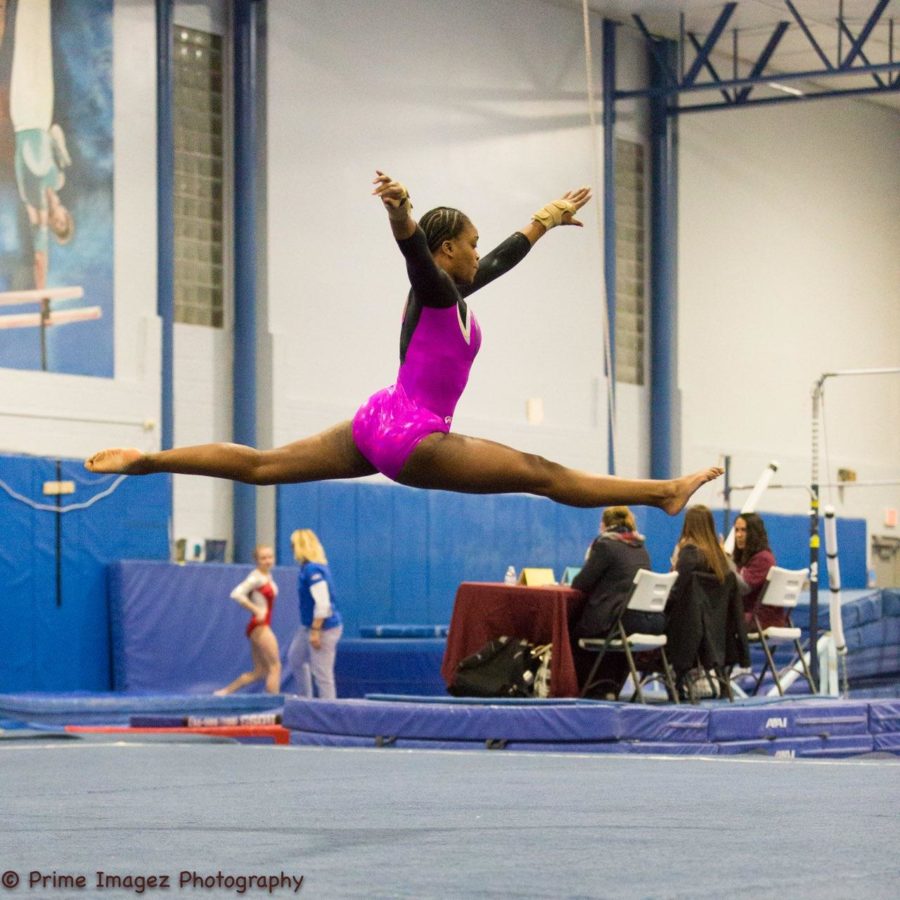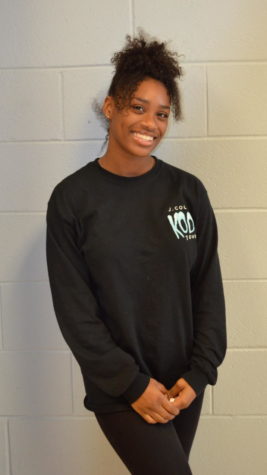Flipping For Gymnastics: Student-Athlete Balances Challenging Sport, School
February 14, 2018
“I do not plan on quitting. I only have around four months [left] of gymnastics, but even if I was not graduating in the spring, I would not quit because I love the sport too much.” These are the words of 17-year-old gymnast, Sahara Chapman, who, like many gymnasts her age, must focus on whether or not she will continue her sport after high school graduation.
“I started gymnastics when I was three years old, going on fifteen years,” says Chapman, who trains and competes out of the Fairland Gymnastics center. Every gymnast learns that starting gymnastics at a young age is best, and Chapman is no exception. “On Saturdays, my gym used to have an open gym, and my parents would take me there to let out my energy, because I would jump all over the furniture. While I was there, they told my parents that I had good skills and that I should sign up for classes.”
“When [my friend] and I were younger we were plotting to quit gymnastics and start track for, like, a whole year, but it never happened,” says Chapman. “In my freshman year of high school I was going to try out for field hockey, but didn’t because I was scared, and my mother didn’t get the equipment in time. In my sophomore year, I did track and field for, like, three weeks, and I did like it; but exams were coming up and I was having conflicts, so I did not continue it.”
Almost every gymnast has a little bit of thought of doing another sport. It’s nothing uncommon, it’s just wanting to try new things, not always giving up on the old. For an athlete, time management is the most important things to remember, especially for an athlete who wants to do more than one sport and has a lot of school work. Chapman understands how gymnastics and the other sports relate. “Gymnastics has kept me from playing other sports, not because I didn’t have time, but more because I self-selected out of them, or because of school. If I added another sport, I thought that I wouldn’t be able to handle the workload from school as well. When I joined dance, it showed me that I could juggle two sports at once, and I regret not joining another sport sooner. If I had children I would encourage them to do gymnastics, but I wouldn’t force them to do gymnastics. If they wanted to try another sport I would be more than happy with that,” she says.
Gymnasts must be able to master multiple exercises to excel, and through this mastery a favorite often evolves. Chapman’s favorite event “is vault, because it is quick and easy; but I would also consider it my best event. Bars would be my least favorite event, because it’s hard. But, it is my least favorite, because I am not as good at it and it makes me tired easily.”
Chapman discusses the hardest part about her gymnastics career: “The hardest part about gymnastics is trying to get over a mental block. A mental block can happen when you have a bad fall on a skill, or if you just really realize what you are doing and get scared. It can take weeks for you to get the skill back; and that becomes frustrating, because you feel that you are not scared to do the skill, but when you go for it, you are still scared.”
We all learn something from the things we do every day. We learn a lot when we spend a significant amount of time doing one specific thing, like gymnastics. For Chapman, gymnastics has taught her many important lessons through the years. “Gymnastics has helped me to be disciplined and know how to work on a team,” she says. “Gymnastics has also taught me [that] my team, we are a family. When I’m gone from practice too long I miss them, and we always have each others’ backs no matter what.”
There are things that we all would want to go back and change if we could. Chapman discussed what she might have done differently if she could: “If I could go back 5 years, I would join another sport and probably transfer to USAG instead of Mason Dixon/Excel. I would probably join a sport like track or field hockey. Gymnastics competitions are usually 4-5 hours long, depending on how fast or slow the judges are going. You go to each event and have a timed warm up. The amount of time you have to warm up is based on the number of gymnasts you have in that group. In my level, we get 1 minute and 30 seconds per gymnast. After your warm up you go say hello to the judges, then you compete. At the end of the meet we have awards based on age groups and then we have team awards based on levels.”
The Olympics is probably a dream for every gymnast when they are younger, but as they grow and get busy, they learn that maybe it’s not for them. Chapman says, “The goals of gymnastics are different depending on the person. There is not one main goal for all gymnasts. When you are a little girl, you probably dream of going to the Olympics, but as you get older you see your goals clearly and know for sure if you want to go to the
Olympics.”
She continues, “When I was younger my goals of gymnastics were to compete in the Olympics, or to do it in college. As I got older, [I] realized that getting a chance to go to the Olympics was a 1/1,000,000 chance, and [it] was most likely not going to happen, based on where I was with my skills. After that, I aimed for college, but then decided that if I wanted to pursue my career, doing varsity gymnastics in college would most likely not work. I am considering doing club gymnastics in college, if the university I go to has a club team.”











































